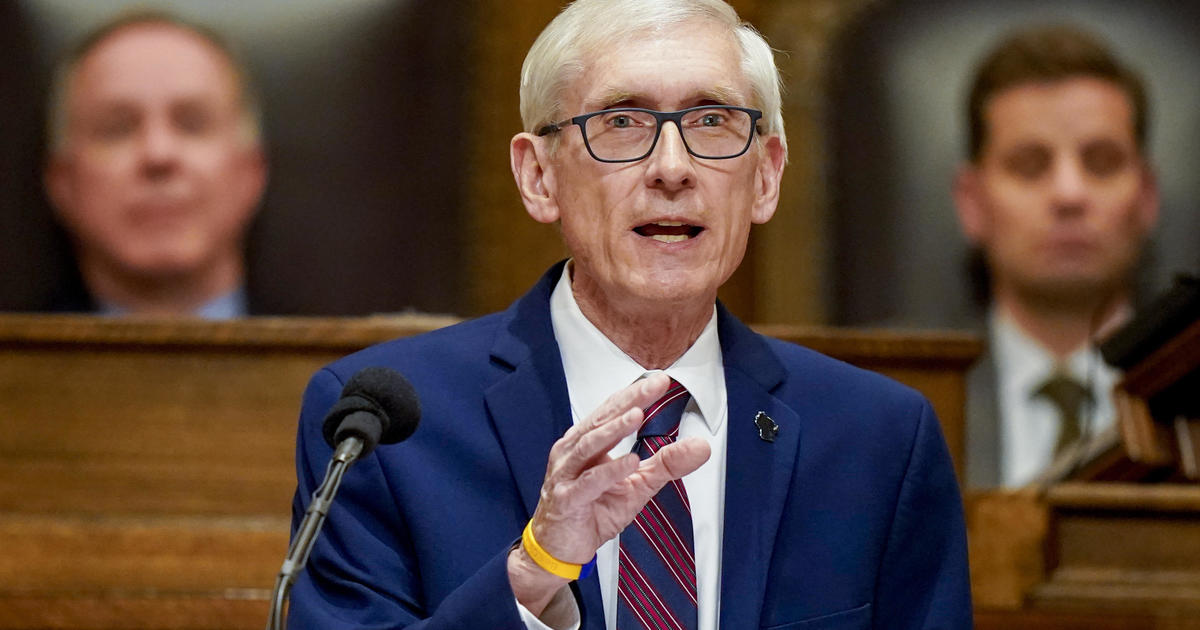BREAKING: Wisconsin Governor Tony Evers Defies Trump Administration, Refuses to Claw Back SNAP Benefits for 700,000 Residents
By Elena Ramirez, National Political Correspondent
Madison, Wis. – November 10, 2025 – In a bold act of defiance that has ignited a firestorm across the nation’s political landscape, Wisconsin Governor Tony Evers issued a resounding “No” to the Trump administration’s demand to reverse full SNAP benefit payments to nearly 700,000 low-income residents, including 270,000 children. The Democratic governor’s terse response, delivered late Saturday, underscores a deepening rift between progressive state leaders and the federal government amid an escalating partial shutdown that has left millions of Americans teetering on the brink of hunger.
The standoff erupted just days after a federal judge in Rhode Island ordered the U.S. Department of Agriculture (USDA) to ensure full funding for November’s Supplemental Nutrition Assistance Program (SNAP) benefits, commonly known as food stamps. The ruling came as the program faced a funding lapse due to the ongoing congressional impasse over government financing. In response, Evers’ administration, alongside a coalition of states, swiftly loaded full benefits onto FoodShare cards – Wisconsin’s version of SNAP – allowing recipients to access groceries and essentials without delay. But the Treasury Department’s subsequent refusal to reimburse grocers for those purchases prompted a swift backlash from Washington.

On Saturday, Patrick Penn, the USDA’s deputy undersecretary, fired off a directive to state SNAP directors nationwide, labeling the payments “unauthorized” and ordering them to “immediately undo any steps taken to issue full SNAP benefits for November 2025.” The missive warned of potential penalties for non-compliance, thrusting states into a precarious legal and financial bind. For Wisconsin, which had already disbursed the funds using state lines of credit, the order amounted to a call to claw back aid from families already relying on it to stave off empty pantries.
Evers, a former teacher and superintendent who has long championed education and social welfare, wasted no time in pushing back. In a statement laced with moral outrage, he declared: “No. Pursuant to and consistent with an active court order, Wisconsin legally loaded benefits to cards, ensuring nearly 700,000 Wisconsinites, including nearly 270,000 kids, had access to basic food and groceries.” He accused the Trump administration of breaking its own promises, noting that officials had previously assured states they were “actively working to implement full SNAP benefits for November and would ‘complete the processes necessary to make funds available.’ They have failed to do so to date.”
The governor’s rebuke extended to a scathing indictment of federal inaction. “I can’t imagine why the Trump administration would want to double down on preventing Wisconsinites who are hungry from getting food to eat, and I can’t imagine why congressional Republicans are standing by and doing nothing to stop them or pass a funding measure that ensures folks don’t go hungry or go broke trying to afford health care,” Evers wrote on X, formerly Twitter. “This is basic stuff, folks. It’s pathetic.”
Evers’ administration is not standing alone in the courtroom. Late Friday, Wisconsin joined a bipartisan coalition of states in filing an emergency letter to the 1st U.S. Circuit Court of Appeals, urging enforcement of the Rhode Island judge’s directive against the Trump administration’s “last-ditch effort to yank SNAP payments from states across the country.” The filing highlights the human stakes: Without federal reimbursement, Wisconsin anticipates exhausting its temporary funds by Monday, potentially leaving grocers unpaid and families in limbo. “Our administration is actively in court fighting against the Trump Administration’s efforts to yank food assistance away from Wisconsin’s kids, families, and seniors, and we are eager for the court to resolve this issue by directing the Trump Administration to comply with court orders and provide the certainty to the many Wisconsin families and businesses who rely on FoodShare,” Evers added.

The crisis traces back to October 1, when the partial government shutdown – now in its 41st day – halted routine federal funding for SNAP, affecting over 42 million Americans nationwide. A temporary court order briefly mandated full payouts, but Supreme Court Justice Ketanji Brown Jackson paused it on Friday, citing procedural concerns. In the chaotic interlude, states like Wisconsin, New York (which served 2.9 million recipients), Oregon, Pennsylvania, and Connecticut rushed to distribute benefits, only to face the USDA’s retroactive reversal.
On the ground in Wisconsin, the ripple effects are stark. In Milwaukee’s Kinship Community Food Center, lines snake around the block as families supplement dwindling benefits with pantry staples. Latricia Williams, a mother of a 4-month-old, told Wisconsin Public Radio she relies on FoodShare for infant formula: “All my benefits go to his milk. I stock up on that.” From Eau Claire to the dairy farms of the northwoods, recipients report anxiety over holiday meal planning and winter heating bills. Food banks, already strained, have seen a 20% uptick in demand since the shutdown began, according to Feeding America.
Evers’ stand has galvanized Democratic governors across the map, framing the dispute as a test of compassion versus cruelty. Oregon’s Tina Kotek dismissed the USDA directive outright: “This is ridiculous, immoral, and Oregon will fight this every step of the way.” Massachusetts’ Maura Healey vowed court battles: “If President Trump wants to penalize states for preventing Americans from going hungry, we will see him in court.” Even in Republican-led states, whispers of reluctance suggest the order’s unpopularity transcends party lines.
Critics of the Trump administration, including Senate Minority Leader Chuck Schumer, decried the move as “heartless brinkmanship” designed to pressure Democrats in shutdown negotiations. “Starving children to score political points? This is the legacy of MAGA governance,” Schumer said in a floor speech Sunday. White House Press Secretary Karine Jean-Pierre, however, defended the USDA’s position, arguing that states overstepped by issuing benefits without secured federal backing, potentially exposing taxpayers to billions in unauthorized debt.

As the appeals court weighs the coalition’s plea, the clock ticks for families like Williams’. Evers’ “No” – a single syllable echoing the resolve of a man who once taught second-graders – has become a rallying cry. “We need every Democratic governor to stand in solidarity with hungry Americans and refuse to comply with the unlawful and needlessly cruel orders of the Trump regime,” Evers urged in his statement, calling for a unified front.
In Madison on Sunday, a small rally outside the state Capitol drew hundreds, chanting “Food for all, not for some!” Organizers from the Wisconsin Anti-Hunger Coalition hailed Evers as a “hero for the heartland,” while passing out hot meals funded by private donations. “This isn’t just about Wisconsin,” said coalition director Sarah Barr. “It’s about whether America lets its most vulnerable pay the price for D.C. dysfunction.”
The legal saga could drag into December, but Evers remains unflinching. “Basic stuff,” he reiterated on X, a nod to the elemental right to nourishment. As winter bites harder, his defiance may well inspire a chorus of “Nos” from coast to coast, forcing a reckoning on the shutdown’s true cost: not dollars, but dignity.





